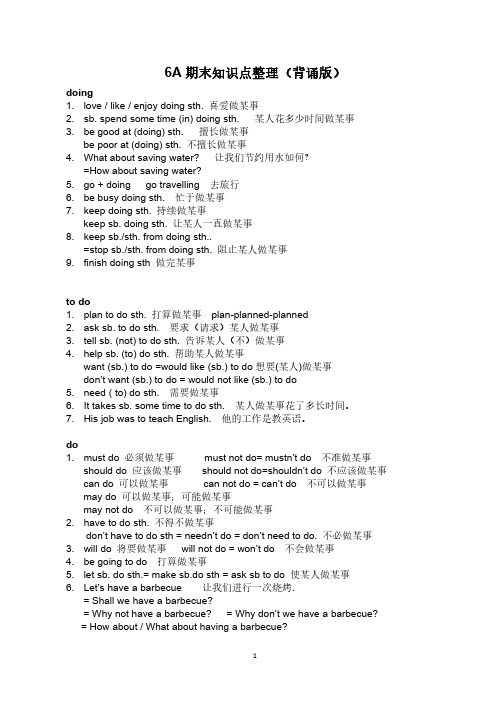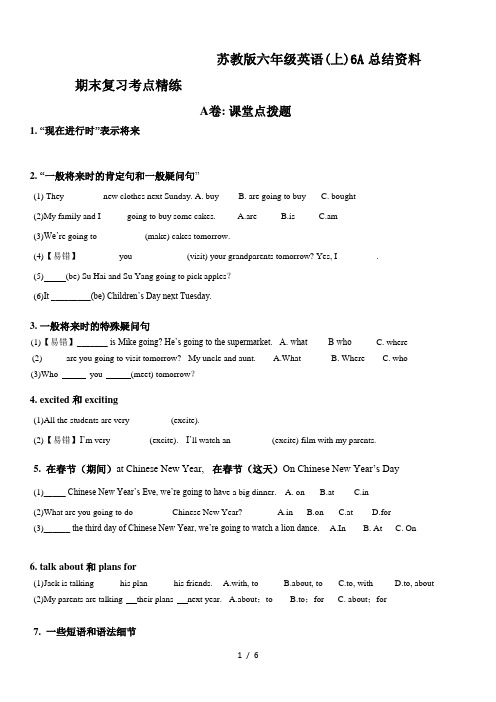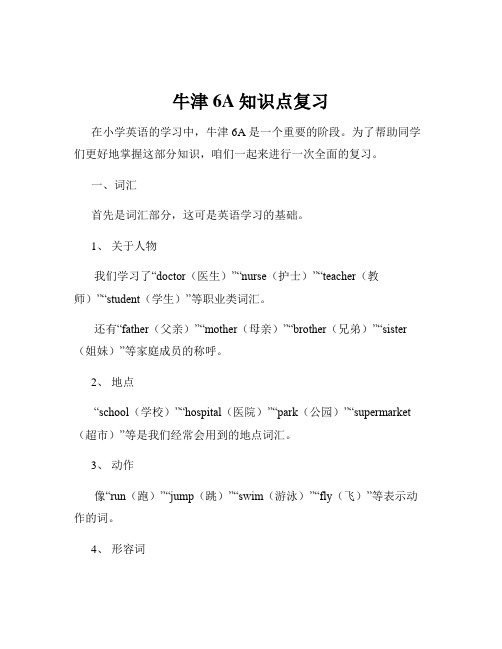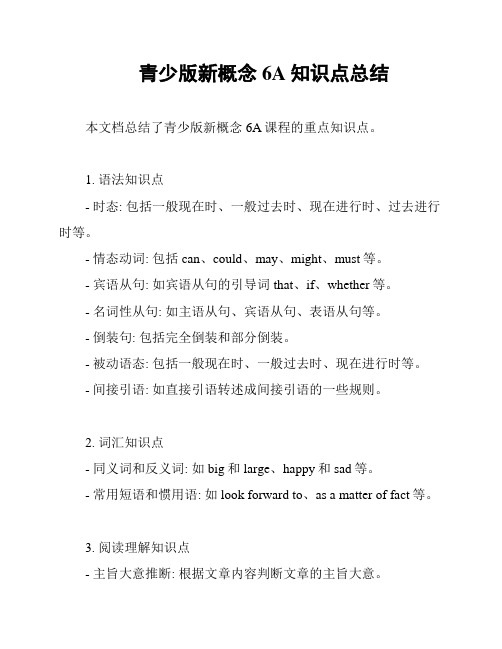6A 总结复习
超全面的6A英语期末复习

非常全面的6A英语知识点Unit1单词:always touch question ask(反)answer mean(名)meaning must/can/should/may(情态动词) pick public sign cousin danger(形)dangerous away grass bird cage shouldn’t=should not quiet(副)quietly smoke litter park[停车] suddenly note[钞票] nearby quickly keeper something/anything/nothing point fine[罚款]词组:1.take a walk散步2.keep off the grass 请勿践踏草坪3.make (much) noise 发出噪音4.look around环顾四周5.pick up捡起pick it/them up 【注:代词必须放在中间】pick the note up= pick up the note【注:若是一个具体的东西,可放在中间或后面】e up to sb. 朝某人走过来7.a ten-yuan note 一张十元钞票an eight-yuan note 一张八元钞票8.a park keeper 一位公园管理员9.point to指向10.FINE ¥10 罚款10元11.give me ten yuan 给我十元give sth. to sb.= give sb. sth.12.ask sb. about sth. 问某人关于某事13.public signs 公共标志14.only four years old 只有四岁15.mean different things 表示不同的意思16.have a lot of questions 有许多的问题17.stay away from = keep off远离18.walk on the grass 在草地上行走19.the sign on the birds’cage在鸟笼上的那个标志句型:1.He is asking Ben some questions about them. 他正在问本一些关于它们的问题。
苏教版六年级英语6A总结计划资料期末复习计划一般将来时专项练习

六年上U8 一般未来一、观点:表示将要生的作或存在的状及打算、划或准做某事。
句中一般有以下状:tomorrow, next day(week, month, year⋯),soon,this evening, the day after tomorrow(后天)等。
二、基本构:① be going to(打算、将要) +原形;②will(打算、将要)+原形.三、否认句:在 be ( am, is, are)后加not或will+ not=won’t.比如: I ’m going to have a picnic this afternoon.→ I’m not going to have a picnic this afternoon.I will have a picnic this afternoon.→ I won’ t have a picnic this afternoon.四、一般疑句:be 或 will提到句首,some改any, and改or,第一二人称互,尾加号。
比如: I ’m going to have a picnic this afternoon.→Are you going to have a picnic this afternoon?Yes, I am. / No, I am not.I will have a picnic this afternoon.→Will you have a picnic this afternoon?Yes, I will. / No, I won’ t.五、同句: be going to = willI am going to go swimming tomorrow(明日). = I will go swimming tomorrow.:填空。
1.我打算明日和朋友去野炊。
I_____ _______ _________ have a picnic with my friends.= I ________ have a picnic with my friends.2.下个礼拜一你打算去干嘛 ? 我想去打球。
6A全册的知识点

6A各个单元的知识点6A Unit 1 The king’s new clothes一、单词/词组1. long long ago 很久以前2. new clothes新衣服3. make new clothes for you 为你制作新衣服make sth for sb4. show the king his new clothes 给皇帝展示新衣服show sb. sth.= show sth. to sb.5. try on 试穿try on the coat=try the coat ontry it/them on6. magic clothes 有魔力的衣服7. walk through步行穿过8. in his new clothes 穿着他的新衣服9. shout at sb. 对某人大叫 10. laugh at sb.对某人大笑11. look at 看…. 12. point at 指向…13. fit well 非常适合14. an American cowboy 一个美国牛仔15. a Scottish man 一位苏格兰人16. tell a story 讲一个故事17. say a/one sentence 说一句话18. on the mountain 在山上19. the next sentence下一句话20. live in the house住在房子里21. tell the boy a story 给这个男孩讲一个故事 tell sb. sth.22. it is one’s turn 某人的机会23. think hard 努力思考24. have to 不得不 have to do sth.25. in front of 在….前面(外部) in the front of 在… 前面(内部)26. walk by 路过27. be nice to sb.对某人好28. look after 照顾29. turn into 变成二,句型1. Long long ago, there was a king. 很久很久以前,有一位国王。
[译林版]6A 期末重难知识点整理及配套练习
![[译林版]6A 期末重难知识点整理及配套练习](https://img.taocdn.com/s3/m/c9ea18f76edb6f1afe001fb8.png)
6A 期末复习重难点知识点1:时间介词 in/on/atat - 具体时间点如 at five o’clockon- 与day(日子)相关,如日期 Monday;July 1st; birthday, Children’s dayin - 范围大一点的时间段 in a week, in July,in spring, in 2020*固定搭配*: in the morning/afternoon/eveningat night/noonat the Dragon Boat Festival (以Festival结尾的中国传统节日)at Christmason/at the weekend 在周末on Monday morning 在周一的早上(早中晚之前有词修饰)一、根据句意,用正确的介词填空。
1. My mother usually cooks ______ 5 o'clock.2. I get up _____ half past six every morning.3. My birthday is _____ November 11th.4. It rained heavily ______ a cold night.5. We watched a football game ______ National Day.6. What does he usually do _______ weekends?7. I go to school ______ Monday ______ Friday. ____ Saturday and Sunday, I stay at home.8. I’m going to have a big dinner with my friends _______ next week.知识点2:名词单复数1. 名词单复数变化巧记顺口溜:规律口诀:名词复数有规律,一般词尾加s;如:rooms辅音字母+y, y变身i + es;如:families元音字母+y,直接就把s加;如:boyss,x,ch,sh;要把es往后加;如:boxes遇到f,fe;字母v来把它替,es在后别忘记;如:knives字母o来真神奇:有生命来es,没有生命+s 如:photos(无生命);mangoes(有生命)单复数同形:中日人们来欢聚,相约一起吃羊鱼 Chinese/Japanese/people/sheep/fish练习:写出以下名词的单复数。
6A期末知识点复习整理(1)

6A期末知识点整理(背诵版)doing1.love/like/enjoy doing sth.喜爱做某事2.sb.spend some time(in)doing sth.某人花多少时间做某事3.be good at(doing)sth.擅长做某事be poor at(doing)sth.不擅长做某事4.What about saving water?让我们节约用水如何?=How about saving water?5.go+doing go travelling去旅行6.be busy doing sth.忙于做某事7.keep doing sth.持续做某事keep sb.doing sth.让某人一直做某事8.keep sb./sth.from doing sth..=stop sb./sth.from doing sth.阻止某人做某事9.finish doing sth做完某事to do1.plan to do sth.打算做某事plan-planned-planned2.ask sb.to do sth.要求(请求)某人做某事3.tell sb.(not)to do sth.告诉某人(不)做某事4.help sb.(to)do sth.帮助某人做某事want(sb.)to do=would like(sb.)to do想要(某人)做某事don’t want(sb.)to do=would not like(sb.)to do5.need(to)do sth.需要做某事6.It takes sb.some time to do sth.某人做某事花了多长时间。
7.His job was to teach English.他的工作是教英语。
do1.must do必须做某事must not do=mustn’t do不准做某事should do应该做某事should not do=shouldn’t do不应该做某事can do可以做某事can not do=can’t do不可以做某事may do可以做某事;可能做某事may not do不可以做某事;不可能做某事2.have to do sth.不得不做某事don’t have to do sth=needn’t do=don’t need to do.不必做某事3.will do将要做某事will not do=won’t do不会做某事4.be going to do打算做某事5.let sb.do sth.=make sb.do sth=ask sb to do使某人做某事6.Let’s have a barbecue让我们进行一次烧烤.=Shall we have a barbecue?=Why not have a barbecue?=Why don’t we have a barbecue?=How about/What about having a barbecue?doing/to do1.forget doing sth.忘了做过某事forget to do sth.忘了要做某事2.remember doing sth.记得做过某事remember to do sth.记得要做某事3.stop doing sth.停止做某事stop polluting them停止污染它们stop to do sth.停下(手头正在做的事)去做另一件事4.begin to do/begin doing开始做某事=start to do/start doingdoing/do1.see sb.doing sth.看见某人正在做某事(表示动作正在发生)see people flying kitessee sb.do sth.看见某人做某事(看见动作全过程,表示经常性发生的动作)表示时间的介词:in/on/at1.年份/季节/月份前用介词in2020in spring/summer/autumn/winterin January/February/March/April/May/June/July/August/September/October/November/Decemberin the morning/afternoon/eveningin15years在15年之后(一般将来时)用How soon提问在过去in the past在未来in the future2.具体某一天用介词on星期前面用介词onon Children’s Day在儿童节on Sunday/Monday/Tuesday/Wednesday/Thursday/Friday/Saturdayon a windy day on the twelfth of August=on August the twelfth在8月12日具体某一天的某个时段用介词onon the night of Monday=on Monday night3.at noon在正午at night在晚上at seven fifteen=at a quarter past sevenat the Mid-autumn Festival在中秋节期间表示地点的介词:in/on/aton the Earth在地球上in China in Shanghaiat school at the station in the classroom in classat home在家at work在工作中at the airport在机场at these beautiful beaches在这些美丽的沙滩on the Internet在因特网上on their farms在他们的农场I.towrite sth.to sb.写……给某人be important to sb/do sth对……重要be important for sb to do sth对某人来说去做某事重要the answers to the questions问题的答案the key to the door门的钥匙take sth.to sb./sp把某物带给某人/带到某地bring sth.to sb.=bring sb.sth.把某物带来给某人bring-brought-broughta trip to sp一次去某地的旅行travel to different cities去不同的的城市旅行drive sb.to sp.开车载某人去某地listen to sb.听某人说listen to him听他说II.forleave A离开A地leave for B出发去B地ask(sb.)for sth.(向某人)请求某物ask them for helpwait for me/an hour wait in the classroom/at the stationprepare A for B为B准备了A prepare for a party=get(be)ready for a party read the passage for information为了(获取)信息阅读短文=read the passage to get informationbuy sth.for sb.=buy sb.sth.买给某人某物buy-bought-boughtIII.with1.take sth.with sb.随身携带……2.help sb.with sth.帮助某人某事3.cook food with wood用木头烧食物=use wood to cook food=use wood for cooking food4.be careful with sth小心on/about/of/from1.write a report on...写一份关于……的报告2.talk about sth.讨论某事talk to/with sb.和某人讨论3.a photo/picture/map/poster of sth.一张……的图片/地图/海报4.collect sth.from...从……收集某物get sth.from...从……得到某物表示数量1.几乎没有:few+可数名词复数little+不可数名词few-fewer-fewest little-less-least少量;一些:a few+可数名词复数a little+不可数名词几个:several+可数名词复数一些:some+可数名词复数/不可数名词许多:many+可数名词复数much+不可数名词many/much-more-most大量:a lot of=lots of=plenty of+可数名词复数/不可数名词a lot放在动词后,修饰动词2.太多:too many+可数名词复数too much+不可数名词太少:too few+可数名词复数too little+不可数名词very few/little很少too few/little太少fewer/less更少only a few/a little只有一点quite a few/a little相当多3.one and a half hours=one hour and a half一个半小时(复数)4.one–first two–second three-third four-fourth five-fifth eight-eighth nine-ninth twelve-twelfth twenty–twentiethforty---fortieth ninety---ninetieth5.both of两者都neither of两者都不all of三者及以上都none of三者及以上都不1.连系动词:be,become,get,turn,look=seem,feel,sound,smell,taste,+形容词区分:look happy看起来很开心look happily at...很开心地看着……smell nice smell the flowerstaste nice taste the food2.make sb.+adj.使某人变得3.keep+形容词保持…… e.g.keep healthy=stay healthy保持健康keep sth.+形容词使……处于某种状态keep the school clean4.as+形容词/副词的原级+as像……一样5.(much/even)比较级+than比……更……6.one of+形容词最高级+名词复数最……的之一He is one of the tallest boys in our class.How:1)问方式:by(doing)sth.2)问怎么样,划线部分为“形容词/副词”How far:问距离twenty minutes’walkHow long:问时间段for+一段时间How soon:多久以后in+一段时间How often:多久一次three times a dayHow many times几次once/twice短语1.have been to去过某地,已经回来了(可跟次数,already/yet/never/before)have gone to去了某地,还没有回来have been in sp for time在某地待多长时间have(has)been there去过那里2.be in danger处于危险中3.turn on/off打开/关掉turn it/them on把它(它们)打开4.fall down摔倒fall-fell-fallen5.cut down砍伐cut-cut-cut6.put out fires灭火put-put-put7.look for寻找look after=take care of照顾find找到(东西)find-found-found find out查明(事情)8.enough的用法:形前名后形容词/副词+enough good enough足够好quickly enough足够快enough+名词enough vegetables足够的蔬菜enough rooms足够的房间。
六年级语文复习备考总结

六年级语文复习备考总结六年级的语文考试是一个重要的里程碑,对于学生来说,这个阶段是扎实复习的时期。
为了取得好成绩,我在备考中付出了很大的努力。
以下是我的复习备考总结。
一、课文复习课文是语文考试的重点,在备考过程中,我重点复习了每一篇课文。
首先,我对每篇课文进行了多次阅读,理解了每个词句的意思。
然后,我重点分析了每篇课文的结构和主题,并做了一些笔记,以便在考试时能够轻松理解和回答问题。
在复习课文时,我还重点关注作者的写作技巧和表达方式。
我学习了一些常见的修辞手法,如比喻、夸张、对仗等,并在模拟考试中进行了实践。
通过不断的练习,我提高了阅读理解和写作能力。
二、作文复习作文是语文考试的一项重要内容,我在备考过程中也特别注重作文的练习。
首先,我积累了一些常用的写作素材,如人物、事件、地点等,并学习了一些常用的句子和表达方式。
然后,我根据不同的题目要求,进行了针对性的练习。
在作文练习中,我还注重提高写作的逻辑性和连贯性。
我学习了一些写作技巧,如段落的分析、过渡句的运用等,并在练习中加以应用。
通过这些练习,我发现我的写作能力得到了提高,写作也变得更加流畅。
三、语法复习语法是语文考试中的基础知识,我在备考过程中也特别注重语法知识的复习。
我系统地复习了动词、名词、形容词、副词等基础知识,并做了大量的练习题。
我还学习了一些常见的语法错误并加以纠正。
在语法练习中,我还注重强化了对常用句型的掌握。
通过分析不同句型的结构和用法,我能够更好地理解和运用这些句型。
在考试时,这些句型知识对我的阅读理解和写作能力有很大的帮助。
四、模拟考试为了更好地了解自己的复习进度,我进行了多次模拟考试。
我选择了一些历年考试题和模拟试卷,并在规定时间内完成了考试。
通过这些模拟考试,我发现了自己的不足之处,并及时进行了调整。
在模拟考试中,我注重了时间的控制。
我学会了根据题目难度和分值合理安排时间,并尽量减少耗时的题目。
通过这些练习,我提高了解题速度和答题准确率。
新译林英语6A总复习默写卷

新译林英语6A期末总复习(一)衔接教材复习1.害怕的2.顺着,沿着3.生气的,愤怒的4.问路5.向…求助6.婴儿,宝宝7.因为就8.就寝时间9.在…中间 10.小船 11. 身体 12.加拿大13.检查 14.中国新年 15.圣诞夜 16.圣诞树17.出来 18.来学校 19.可爱的 20.牙医21.困难的 22.重阳节 23.赛龙舟 24.赶走25.容易的 26.网友 27.第八 28.也29.第十一 30.工厂 31.仙女 32.圣诞老人33.父亲节 34.打仗 35.最后 36.合适,合身37.折叠 38.森林 39.四十五 40.第四41.满的 42.出来 43.到达 44.团聚45.长颈鹿 46.离开 47.去划船 48.去爬山49.去钓鱼 50.去溜冰 51.去游泳 52.去…53.去看电影 54.组 55.生日快乐 56.努力地57.玩得高兴! 58.休息 59.试一试 60.吃晚饭/午饭61.不得不 62.救命啊! 63.英雄 64.洞65.你好吗? 66.感到疼痛 67.你好吗? 68.我等不及了69.我想是. 70.冰 71.我很好,谢谢. 72.在上午/下午/晚上73.正合适,正好 74.国王 75.瓢虫 76.丢下,留下77.客厅 78.当心! 79.许个愿吧! 80.整理床铺81.比赛 82.肉 83.圣诞快乐 84.信息,消息85.地铁 86.母亲节 87.蘑菇 88.在…旁边89.不太好. 90.在你的右侧 91.出局 92.鹦鹉93.密码 94.害虫 95.踢足球/弹钢琴 96.土豆97.指着 98.礼物 99.王子 100.布丁101.推 102.穿上 103.重阳糕 104.粽子105.江河 106.机器人 107.难过的 108.色拉109.一会儿见. 110.明天见. 111.发送,寄给 112.带..参观113.生病的 114.闻起来 115.汤 116.斑,点117.贴纸 118.长筒袜 119.尾巴 120.保重121.这是给你的. 122.课程表 123.西红柿 124.交通灯125.火鸡 126.向左/右转 127.叽喳声 128.二十八129.明白理解 130.蔬菜 131.等一会儿 132.等候133.醒来 134.欢迎来到.. 135.欢迎回到 136.好样的137.湿的 138.真遗憾! 139.是什么颜色 140.赢141.今天星期几? 142.几点了? 143.翅膀 144.作家145.好吃的,美味的 146.也 147.总是 148.秋天149.1-12月 150.在…旁边/前面151.生日 152.书店 153.两个都 154.光盘155.聊天 156.圣诞节 157.酷 158.堂兄弟159.奶牛 160.端午节 161.饺子 162.早早的163.农场 164.节日 165.乐趣 166.上/下车167.重的 168.湖泊 169.中秋节 170.月饼171.山脉 172.接着,然后 173.人们 174.摘,拾175.野餐 176.地点 177.季节 178.第二179.春夏秋冬 180.应该181.喊叫 182.雪人 183.春节 184.脱下185.第三 186.双胞胎之一 187.温暖的 188.什么时候189.精彩的 190.在夜里 191.周末 192.有害的193.擅长于 194.刷牙 195.画画 196.喝水197.离…远 198.快点 199.午餐盒 200.一个,另一个201.柔软的 202.扫地 203.吃药 204.洗碗205.看电影 206.多么漂亮的蛋糕啊! 207….怎么了? 208.你想要…吗? 209…..岁(二)词组复习U1词组复习 U2词组复习1. 皇帝的新装 1.9月20日2. 很久很久以前 2.上午天气晴朗3. 有一天 3.骑自行车去公园4. 拜访国王 4.一场鹦鹉表演5. 为你做新衣 5.看见一些有趣的鹦鹉6. 向国王展示他的新衣 6.变得有风的盒多云的7. 试穿这些神奇的衣服 7.在空中放风筝放的高8. 聪明的/愚蠢的人 8.吃饭的时候了9. 步行穿过城市 9.带来一些饺子.蜂蜜和饮料10. 穿着他的新衣 10.面包上的一些蚂蚁11. 许多人在街上 11.吃我们的午饭12. 看着国王 12.天上的乌云13. 一个小男孩 13.又饿又湿14. 指向 14.下一整天雨15. 想要做某事 15.把午饭带到公园去16. 嘲笑他 16.挑选三张卡片17. 一个美国牛仔 17.做得好!18. 穿牛仔裤 18.一起欢呼19. 一个穿着苏格兰短裙的苏格兰男人 19.走开20. 每个学生 20.看起来难过21. 在山上 21.丢失了我的新风筝22. 说一句话/下一个句子 22.想要知道为什么23. 住在这个房子里面 23.然后发生了什么事?24. 讲一个故事/给男孩讲一个故事 24.今天上午25. 轮到你了. 25.爬上小山26. 努力思考 26.飞得太高27. 不得不 27.抓紧他28. 在狮子的房子前面 28.飞走29. 一个老人 29.在小山附近找到它30. 摘花 30.上周日31. 和狮子一起生活 31.在你的日记里32. 把你的孩子给我 32.看一部电影33. 变成一个王子 33.野餐34. 路过这座房子35. 照顾他U3词组复习 U4词组复习1.为我摘一个橘子 1.每天努力工作2.来自树上的一个菠萝 2.在假期3.为我抓条鱼 3.美国人/英国人4.来自海里的一条鱼 4.发明飞机/火车5.三个主要的学校假期 5.一节英语课/数学课6.复活节/圣诞节 6.看窗外7.暑假/寒假 7.听我说8.到家晚 8.继续9.一场时装秀 9.生气10.穿纸质T恤衫/短裤 10.造句11.问他关于她的情况 11.等待答案/等他12.进展顺利 12.一岁/三岁13.挂着许多瓶子 13.用..和..作比较14.首先 14.在蛋糕里的鸡蛋15.太糟糕 15.寒假/暑假16.车展 16.在工厂里的工人17.酷车 17.过去和现在18.一个生日聚会 18.六年前19.看望他的堂兄弟 19.读和画20.对..感到兴奋 20.做许多事情21.假期乐趣 21.给他的朋友们写信22.回到学校 22.使用电话机23.国庆节假期 23.在办公室里24.打电话给他 24.给人们打电话25.在家 25.有一个移动电话26.去上海 26.在任何地方给人们打电话27.拜访我的阿姨/参观上海博物馆 27.写电子邮件28.去外滩 28.三十年前29.看见许多有趣的东西 29.听收音机30.极大的乐趣 30.读报获取新闻31.在星星湖附近的农场 31.在互联网上读并看新闻32.去钓鱼 32.读电子书33.抓到一条大鱼 33.在校交朋友34.把鱼给你(2种) 34.从商店买东西35.长城\ 35.来自全世界的网友36.故宫 36.在网上购物37.颐和园38.天安门广场U5词组复习 U6词组复习1.继续走 1.保持我们的城市干净2.保持安静 2.这些我们城市的图片3.对女孩说 3.汽车的尾气4.小鸟 4.使空气变脏5.在美国/英国 5.工厂里的黑烟6.远足旅行(2种) 6.使街道变得又乱又脏7.感到饥饿和疲劳 7.乘地铁上学(2种)8.寻找我的香蕉 8.步行上学(2种)9.带来一些作为午饭 9.死鱼10.给他一个香蕉(2种) 10.把..从..搬走11.要一个 11.把垃圾放进垃圾桶12.一个甜的橘子 12.种植更多的树13.在树上发现/一个标记 13.有助于进化空气14.在这儿吃菠萝 14.你们的主意15.在他们周围看见许多猴子 15.扫地16.看着他们的梨 16.在水里的垃圾17.一些公共地方 17.把垃圾扔在地上18.那么高兴 18.步行回家2种19.为..设计标志 19.在小河边20.乘地铁为 20.把我们的垃圾放在垃圾桶里21.听和选 21.两只小乌鸦22.看见/了解那个公共标志 22.坐在小山丘上23.在我们周围 23.放学后24.地铁(美式英式) 24.喜欢住在城市25.在一个购物中心 25.又干净又漂亮26.当心! 26.把香蕉皮扔在地上27.一家果汁店/把果汁带进商店 27.滑到在香蕉皮上28.进入 28.去医院看病29.在餐馆吃些面条 29.把它捡起来30.闻到它/烟味 30.使孩子们开心31.一家玩具/水果店 31.令我生气32.在书店吸烟 32.太迟了33.禁止吸烟/停车/饮食/携带宠物/乱扔垃圾34.禁止喂食/游泳/爬树/垂钓35.禁止践踏草坪 33.使床上变得很乱36.去书店 34.许多博物馆,商店和电影院37.小心地滑.38.危险!39.看见那个标记U7词组复习 U8词组复习1.收集一些纸和塑料袋 1.中国新年2.重复利用这些东西 2.观看舞狮表演3.重复利用塑料瓶制作玩具 3. 从某人那得到一封邮件4.每天 4. 下周5.有趣 5.对。
6A 整理重点内容复习

6A 期中复习资料整理(Unit 1---- Unit4)Name:____________ Classs:________________一、翻译词组。
(30分)1.在墙上 2.keep off the grass3.一件生日礼物_________________ 4.public signs5.问一些问题 6.different things7.捡起 8.make noise 9.read a book 10.look around 11.放学以后_________________ 12. the 22th of October_____________ 13.散步 14. the thirtieth of November___________ 15.5月9日______________________ 16. blow out the candles _______________ 17.4月1日______________________ 18. take off his coat __________________ 19.3月12日___________________ 20. have a birthday party _____________ 21. 刚才_______________________ 22. a roll of film _______________________ 23. 所有的学生_________________ 24. watch the running race _______________ 25. 一部手机 __________________ 26. close the eyes ______________________ 27. 在我的包里 28. pick them up _______________________29. 在眼镜后面__________________ 30. Sports Day ________________________二、选词填空。
【6A文】初中英语知识归纳总结大全

初中英语知识归纳总结大全第一课时名词一、概述1、名词的属性:表示人或事物的名称抽象概念的词叫名词。
2、名词分普通名词和专有名词。
普通名词是表示某一类人或事物,或某种物体或抽象概念的名称。
如:teacher,desks,plates,milk,boG等,专有名词表示某一特定的人、事物、地方团体、党派、国家机关、语言、节日等专用的名称。
(运用)如:China,Chinese,Saturday,June,Green,Beijing,Olympic等。
(专有名词的第一个字母要大写)二、可数名词与不可数名词1、可数名词是指表示人或事物,可以用数来计量的名词,有单复数之分。
如:glass-----glasses;book----books2、不可数名词是指所表示的事物不能用数来计量。
如:paper,rice,water,milk,tea等。
3、有些名词在特定情况下由不可数变为可数名词。
Lighttravelsfasterthansound;(light:光线,不可数)Thelightsareon.(light:灯,可数)4、不可数名词的量的表示不可数名词一般无法用数来计算,前面不能用a或an或数词来表示数量,它的量往往借助于容器来表示。
如:aglassofmilk------fourglassesofmilkapieceofpaper------twopiecesofpaperabagofrice------threebagsofrice三、可数名词的复数形式(识记、运用)1、可数名词在应用时有单复数之分,单数变复数有规则变化和不规则变化两种。
规则变化情况变化形式例词一般情加-s girls;books;况以s,G,ch,s h结尾的名词加-esclasses;boGes;watches;brushes以辅音字母加y结尾的名词变y为i,加es city---cities;baby---babies以f或fe结尾的名词变f,fe为v,加es knife---knives;leaf---leaves以O结尾的名词potatoes;tomatoes;photos;kilos;bamboos;radi os2、少数名词有不规则的变化形式policeman---policemen;man---men;woman---women;tooth---teeth;foot---feet;sheep---sheep;deer---deer;Japanese---Japanese;Chinese---Chinese;fish---fish四、名词所有格(运用)名词的所有格是表示所有关系的形式,它也有构成上的变化。
苏教版六年级英语(上)6A总结资料期末复习考点精练

苏教版六年级英语(上)6A总结资料期末复习考点精练A卷: 课堂点拨题1. “现在进行时”表示将来2. “一般将来时的肯定句和一般疑问句”(1) They ________ new clothes next Sunday. A. buy B. are going to buy C. bought(2)My family and I _____ going to buy some cakes. A.are B.is C.am(3)We’re going to __________(make) cakes tomorrow.(4)【易错】_________you __________ (visit) your grandparents tomorrow? Yes, I ________ .(5) (be) Su Hai and Su Yang going to pick apples?(6)It _________(be) Children’s Day next Tuesday.3. 一般将来时的特殊疑问句(1)【易错】_______ is Mike going? He’s going to the supermarket. A. what B who C. where(2)_____ are you going to visit tomorrow? My uncle and aunt. A.What B. Where C. who(3)Who you (meet) tomorrow?4. excited 和 exciting(1)All the students are very _________(excite).(2)【易错】I’m very ________ (excite). I’ll watch an _________(excite) film with my parents.5.在春节(期间)at Chinese New Year, 在春节(这天)On Chinese New Year’s Day(1)_____ Chinese New Year’s Eve, we’re going to ha ve a big dinner. A. on B.at C.in(2)What are you going to do ________ Chinese New Year? A.in B.on C.at D.for(3)______ the third day of Chinese New Year, we’re going to watch a lion dance. A.In B. At C. On6. talk about 和 plans for(1)Jack is talking _____ his plan _____ his friends. A.with, to B.about, to C.to, with D.to, about(2)My parents are talking their plans next year. A.about;to B.to;for C. about;for7.一些短语和语法细节(1)Nancy often gets emails _________ her friends. A. from B to C. with(2)Let’s ____________tangyuan together. A. to make B making C.make(3)_______ nice fireworks! A.How B.What’s C.What(4)The cook is ____ at a cookbook to ____us some nice food.A.Look, cook B.looking , cook C.looking, cookingB卷: 课后巩固题一.选择( )1.A: What did you do last Mid-Autumn Festival? B:I ______.A. got red packetsB. watched the moonC.eat tangyuan( )2.The teacher is talking his students holidays. A.to;to B.to;about C. about;to ( )3. nice picture! A.How B.What a C.What( )4.Do you often have lunch ________ your family? A.and B.with C.in( )5.Chinese New Year is in January ________ February. A.and B.or C.but( )6.-- you and your mother going to watch a film this evening? -- Yes, .A.Is;we’reB.Are;we’reC. Are;we are二.填入适当的词1.watch(过去式)2.next(反义词)3.plan(现在分词)4.There are a lot of __________(firecracker)on the ground.5.Mike _______ (get) an email yesterday.6.Miss Li__________(buy) some flowers last Sunday.7.【易错】It was nice ______(get) your email.8.______ you _______ ( watch ) a lion dance last year?9.【易错】SuYang’s mother often _________(make) tangyuan. She’s__________(make) some this evening.10. (child) Day is in June.11.【易错】I am happy (get) your email.12.Mike and Helen _______________(buy)some food tomorrow.13.Miss Li__________(buy) some flowers last week.14.My family ______________(watch) a lion dance the day after tomorrow.15.【易错】It (be) the Women’s Day.16.【易错】There (be) a dancing lesson tomorrow morning.17.When you18.What ________he _________ do tomorrow? He __________ ( visit ) his aunt.19.I’m _______(excite)about Children’s Day too.20.What are you going to do _______(at/on) Chinese New Year?三.翻译1.在春节(期间)2.在春节(这天)3.在大年初二4.做蛋糕5.看烟花6.做汤圆7.在除夕8.讨论他们的假日计划9.对…兴奋10.他这个周末准备去拜访他的祖父母。
牛津6A知识点复习

牛津6A知识点复习在小学英语的学习中,牛津 6A 是一个重要的阶段。
为了帮助同学们更好地掌握这部分知识,咱们一起来进行一次全面的复习。
一、词汇首先是词汇部分,这可是英语学习的基础。
1、关于人物我们学习了“doctor(医生)”“nurse(护士)”“teacher(教师)”“student(学生)”等职业类词汇。
还有“father(父亲)”“mother(母亲)”“brother(兄弟)”“sister (姐妹)”等家庭成员的称呼。
2、地点“school(学校)”“hospital(医院)”“park(公园)”“supermarket (超市)”等是我们经常会用到的地点词汇。
3、动作像“run(跑)”“jump(跳)”“swim(游泳)”“fly(飞)”等表示动作的词。
4、形容词“big(大的)”“small(小的)”“tall(高的)”“short(矮的)”“fat (胖的)”“thin(瘦的)”等形容词可以用来描述事物的特征。
要记住这些词汇,不能死记硬背,可以通过图片、句子或者实际场景来帮助记忆。
二、语法语法是英语学习中的重点和难点。
1、一般现在时这是我们经常会用到的时态,表示经常发生的动作或存在的状态。
比如:“I go to school every day(我每天去上学。
)” 主语是第三人称单数时,动词要发生变化,像“He likes playing football(他喜欢踢足球。
)”中的“like”就要变成“likes”。
2、现在进行时表示正在进行的动作,结构是“be +动词的现在分词”。
例如:“I am reading a book now(我现在正在读书。
)”3、一般过去时用来描述过去发生的事情,动词要用过去式。
像“I went to Beijing last year(我去年去了北京。
)”4、名词的单复数一般情况下,直接在名词后面加“s”,比如“book books”。
但有些名词的复数形式是不规则的,比如“man men”“woman women”“child children”。
上海牛津版英语六年级第一学期6A期末复习知识点总结1

must not
必须、很重要或必要不准,不允许或禁止
Wemust study hard.
You mustn’t leave school alone.
提问
把情态动词单独提前
Must we wait foryou?Yes,youmust ; No,youneedn’t.(非mustn’t)
花钱花时间
.spen.tw.yua.o.thi.pen...spen.tw.yua.i.buyin.thi.pen.
I spend two yuan on this pen.=I spend two yuan in buying this pen.
表示提议的句型
Shall we
Shall是情态动词+接动词原形
a little
只能修饰不可数名词,a little milk.
some
a lot of plenty of
既可修饰可数名词又可修饰不可数名词。当及可数名词连用时,只能及可数名词的复数形式连用
k. Plent.o.eggs.
someeggs. a lot of milk. Plenty of eggs.
the one on the left/right , the one in the middle =the left/right/middle one.
地点、方位表述
near离**近
far(away)from离**(很)远
直接接地点
.liv.nea.school. H.live.fa.awa.fro.school.
六年级英语(上)知识点
频度副词
频度副词
always、sometimes、usually、never
青少版新概念6A知识点总结

青少版新概念6A知识点总结本文档总结了青少版新概念6A课程的重点知识点。
1. 语法知识点
- 时态: 包括一般现在时、一般过去时、现在进行时、过去进行时等。
- 情态动词: 包括can、could、may、might、must等。
- 宾语从句: 如宾语从句的引导词that、if、whether等。
- 名词性从句: 如主语从句、宾语从句、表语从句等。
- 倒装句: 包括完全倒装和部分倒装。
- 被动语态: 包括一般现在时、一般过去时、现在进行时等。
- 间接引语: 如直接引语转述成间接引语的一些规则。
2. 词汇知识点
- 同义词和反义词: 如big和large、happy和sad等。
- 常用短语和惯用语: 如look forward to、as a matter of fact等。
3. 阅读理解知识点
- 主旨大意推断: 根据文章内容判断文章的主旨大意。
- 词义推断: 根据上下文判断词语的含义。
- 细节理解: 根据文章中的具体细节回答问题。
4. 写作知识点
- 书信写作: 包括信件格式、开头和结尾的写法等。
- 简单的写作表达: 如描述人物、事件等。
以上是青少版新概念6A课程的知识点总结,希望能够帮助您更好地学习和掌握相关知识。
译林版英语6A期末总复习之句型转换100题

译林版英语6A期末总复习之句型转换100题译林版英语6A期末总复之句型转换按要求完成句子1. XXX.(对划线部分提问)_____ ______ she ______ a film?2. They come from the UK. (对划线部分提问)_____ _____ they come from?3. We should save water.(改成同义句)We ______ _______ water.4. It is Mike’XXX.(用tomorrow替换today改写句子)It _____ _______ XXX’XXX.5. They are making some tang yuan. (改成一般疑问句)_____ they making_______ tang yuan?6. Give me the book, please.(改为同义句)Give the book ______ me, please.XXX we take a bus to school.(同义句转换)Sometimes we_______ to school_______ bus.8.Kitty is making a model plane with her XXX(对画线部分提问)_______ _______Kitty _______with her brother?9.Eddie goes to sleep after breakfast.(改为一般疑问句)_______ Eddie _______to sleep after breakfast?10.XXX XXX.(对划线局部发问)_____ ______Helen _________ toBeijing?11. You can put the clothes away to keep your room clean.(对划线部分提问)_______________ can you ___________ to keep your room clean?12. XXX(改为一般疑问句)______ Ben _______ _______ public signs in the restaurant?13. She had an Art lesson this morning .(用XXX改写句子)She is ______ _______ _____ an XXX .14. Where did you visit ?(改为同义句)_______ _______ did you visit ?15. I was in the playground just now .(改为一般疑问句)_______ ______ in the playground just now ?16.Liu XXX .(对划线部分提问)_______ _______ Liu Tao ______ last week ?17. Nancy is going to go camping.(改否认句)Nancy __________ going to go camping.18. I’ll go and join them.(改否定句)I __________ go __________ join them.19. I’m going to get up at 6:30 tomorrow.__________ __________ __________ to get up at 6:30 tomorrow?(改一般疑问句)20. We will meet at the bus stop at 10:30.__________ __________ meet at the bus stop at 10:30?(改一般疑问句)21. She is going to listen to music after school.(对划线部分提问)_________ __________ she __________ __________ __________after school?22.Yang Ling can make a card for you.(对划线部分提问)__________ can make a card __________ __________?23.Miss Black showed us her new XXX(同义句转换)Miss Black __________ her new clothes __________ ____________.24.There were some people in the street.(改成否认句)There __________ __________ people in the street.25.XXX.(改成普通曩昔式)My uncle __________ __________ a big city.26. I XXX.(否定句)__________________________________________________ ______27. XXX(普通疑问句,一定回覆)__________________________________________________ ______28. That boy can play the piano.(否认句,对划线局部发问)__________________________________________________ ________________________________________________________ ______29. Can the farmer plant any rice in spring?(一定句)__________________________________________________ ______30. Alice can find the old key.(对划线部分提问)__________________________________________________ ______31. There are some flowers on the desk. (改为否定句)There ________ ________ XXX.32. It XXX.(改成同义句)It’s in winter. There a lot of in winter.33. Lucy’s skirt is on_the_bed. (对画线局部发问)________ ________ XXX’s skirt?34. These pens are on the desk now. (用this afternoon代替now)These pens ________ on the desk this afternoon.35. XXX(改为一般疑问句)________ he ________ playing basketball?36. I did shopping last week.(否定句)I ______ ________ shopping last week.37. Mike made some XXX(普通疑问句)________Mike ________any cards for his teachers?38. I XXX.(对划线部分提问)Where _______ ______ in America?39. This dress is very nice.(复数句)______ ______ is very nice?40. That XXX.(同义句)That ______ __ is _____ __.41. It was XXX.(一般疑问句)XXX(否定句)43.It rained all day on 20th September.(普通疑问句)44.XXX(对划线局部发问)45.XXX drinks ,XXX(否定句)46.It’XXX’s.(对划线局部发问)__________________________________________________ _____47. I’d like some ice-cream.(改成普通疑问句)__________________________________________________ _____48. Christmas is on the 25th of December.(对划线部分提问)__________________________________________________ _____49. Stop the car, please.(改成否认句)__________________________________________________ ______50. XXX(对划线局部发问)__________________________________________________ ______51、1.Kitty XXX(对画线部分提问)_________ _________ Kitty _______with her brother? 52.Eddie goes to sleep after breakfast.(改为一般疑问句)_______ Eddie _______to sleep after breakfast?53. Were you in the park this morning? (做肯定回答)Yes, ___________ __________.XXX.(用last night改写)My grandma________ XXX.55. I XXX.(改为否定句)I___________ eat__________ honey in the morning.56. It has two big eyes. (改成否认句)It two big eyes.57. XXX(对划线局部发问)What______ Nancy like _________ ?58.There is some tea in the cup. (改成普通疑问句)59.XXX(归并为一句)60. She has a lot of books. (用They替换She)61. XXX.(用next week改写句子)She is going__________ __________ a film next week. 62. Liu Tao is going to Xi’XXX.(对画线局部发问)__________ is Liu Tao__________ tomorrow?63. We are going to watch XXX.(对画线局部发问)__________ are you going to__________ fireworks?64. Mike got an email yesterday .(改为一般疑问句)__________ Mike__________ an email yesterday?65. I’m going to pick oranges on the farm.(改为否定句)I’m__________ going to__________ oranges on the farm.66.It means “No littering”.(划线提问)67.It means the floor is wet.(普通疑问句)68.Eat and drink here. (否定句)XXX.(改为同义句)70.They mean XXX(普通疑问句) 15、71.The sign near the school means “No parking.” (划线发问)72.You should go in first.(改成否认句)73.Tom can write now.(用last year交换now)74.Please give a banana to me.(改为同义句)75.Do you want some juice?(改成同义句)XXX? (改成XXX)XXX.(改否认句)78.Mr Brown XXX.(改为一般疑问句)79.Helen was four years old.(对画线局部发问)80.XXX to the park just now. (改否认句)81.XXX(改否认句) 17、XXX(对划线局部发问)83.I’d like to go to the Great Wall.(改为同义句)I ________ ________ ________ to the Great Wall.84.I’m XXX(对划线部分提问)85.He could play computer games.(对画线部分提问)86. Tom can write now.(用last year替换now)Tom ____________ ____________ last year87.It means “XXX”.(划线提问)。
牛津英语6a总结复习计划规划方案

牛津英语6a复习计划一、复习策略:1、单词、词组及课文背诵尽可能让每个学生过关。
2、把单词进行归类复习,并适合进行单词归类的不一样练习.整理默写课文中的要点词组与句型。
3、每课作适合的练习,每个单元做一份综合练习。
4、增强听力训练,尽量让学生每节课达成一个五—十分钟的听力练习。
5、实时评讲,实时更正,实时补差,小组互帮,使每个学生在原有基础上有所提升。
二、详细做法:1.按单元进行系统的知识梳理。
先将单元的主要话题和句型提炼出来,进行口头上的演练,在此基础上老师进行要点的概括和系统解说,最后进行相应的讲堂练习,争取当堂课消化稳固知识,提升讲堂效率。
2.归类复习先把知识点进行梳理整合,并联合前一轮复习中学生感觉较困难的知识点进行以讲、练为主的复习,使学生学会有规律的学习。
能够从以下几个方面进行归类(1).音标要解决音标元音字母的发音规律,解决常有的字母组合的发音规律。
形式为读,思,概括,增强和练习。
(2).时态一般此刻时,一般过去时,一般未来时和此刻进行时进行概括,比较复习,能够整理信息词和基本的语法构造。
(A)、一般此刻时态观点:表示常常发生的或习惯性的动作或当前的状态。
规律:一般用动词原形,当主语为第三人称单数的一般此刻时,动词要加s , es ,标记性的单词:always , usually , often , sometimes 如:She usually goes to school on foot(B)、此刻进行时态观点:表示说话时正在发生或进行着的动作。
l ook , now , listen如规律:be +动:词词ing形式.标记性的单:Look , the boy is playing football .作或状况。
规律:生的动(C)、一般未来时态观点:表示未来发:性的单词t omorrow , the day after记be going to do , will do .标tomorrow , next Sunday⋯如:Mr Brown is going to visitHong Kong tomorrow .内间发生的动去某一时辰或某一时(D)、一般过去时态观点:表示过y esterday , last Monday , before , ago, the:作或状况。
- 1、下载文档前请自行甄别文档内容的完整性,平台不提供额外的编辑、内容补充、找答案等附加服务。
- 2、"仅部分预览"的文档,不可在线预览部分如存在完整性等问题,可反馈申请退款(可完整预览的文档不适用该条件!)。
- 3、如文档侵犯您的权益,请联系客服反馈,我们会尽快为您处理(人工客服工作时间:9:00-18:30)。
6A 总结复习(易错题)
一、语音:判断下列每组单词中划线部分发音,相同的打V,不同的打X.
() 1.cousin mouse() 2.answer mask
( ) 3.phone note ( ) 4. Monday play
() 5.bear hear () 6.also eyes
二、英汉互译
1.品尝桔子
2.感到饿
3.想看一些书
4.a big cake with lots of grapes
5.放学后
6.under the bed in my bedroom_____________________
7.两副眼镜
8.第四周
9.住在学校附近10.七月九日
11.上学迟到12.答题
13.第三本书14.我父亲的生日
15.去散步16.Happy New Year
三、选择
( )1.Helen is talking__________ her parents__________ her birthday party.
A.to, about
B.about,in
C.with,for
( )2.We___________________sweets.It‟s good for our teeth.
A.should stay away from
B.shouldn‟t stay away from
C.should eat more ( )3.---Can I eat an ice cream?
---No,______________
A. I can‟t
B.you can‟t
C. you can
( )4.He often does homework _______ Friday evening.
A. in
B. at
C.on
四、用所给词的适当形式填空
1.My birthday is________(come) soon. I would like________(have) a birthday party.
2.--What ______(do) the signs mean?
--They________(mean)‟No littering‟ and …No smoking‟.
3.I _____(swim)in the river last Sunday.
4.Jim usually _________(watch) TV every evening.But yesterday he _________(not).
5.--Where ______(be) you last week?
--I_____(be) in Shanghai. I ________(visit) one of my friends.
6.It is the _______________(twenty-one) of October.
7.He always _________(have) a lot of questions.
8.This isn‟t her diary._______(She) is on the desk.
9.Would you like __________(come) to my birthday party?
五、根据中文完成句子
1.--吉姆,你在干什么?
--我在找我的耳机。
我想听音乐。
--在你的卧室的书桌上。
--What are you doing,Jim?
--I‟m _______ _________ my earphones. I________ to ________ to music.
--________ on the desk in your _____________.
2.昨天晚上我和我的朋友们看了一部有趣的卡通片。
I ________ a funny cartoon with _______ __________ last night.
3.--它们是谁的圆珠笔?
--是她们的。
--Whose _____ ______ are they?
--They‟re ___________.
4.他的爸爸每天早晨八点去上班。
________ father ______ to work _______ eight every ___________.
5.史密斯先生正在公园散步。
他看见草地上有个标识,它的意思是不要践踏草坪。
Mr Smith is ________ a ________ in the park.He ______ a sign on the grass.
It_________ we ________walk walk on the grass.
六、根据要求完成句子。
1.The children sang and danced on Children‟s Day.
否定句:
一般疑问句:
对画线部分提问:
2.I‟d like a cartoon book as my birthday present.
对画线部分提问:What you as birthday present?
3.I know a lot about public signs.
否定句: I______ _____ a lot about public signs.
4.Ben is visiting Jim.
否定句:Ben ______ _______ Jim.
七、首字母填空
1.There‟s a toilet n________.
2.Helen likes flowers very much. There are some flowers in the balcony(阳台)in her home.She w_______
the flowers after school every day.
3.Nancy wants to pick apples from the apple trees,but she is short and can‟t t_______ the apples on the tree.
八、阅读短文,判断正误,正确打”T”,错误打”F”.
Tom is seven.He goes to school every day.The school is near his home.So he goes there on foot and comes back home on time.But today he is late.His mother asks him,”Why are you late today?”
“ I was in the teachers‟ office.”
“Why did you go to the teacher s‟ office?”
“Because my teacher asked us a question in class,and nobody could answer it,but I could.”
“It‟s good to answer the questions.”
“But the questions was …Who put ink on my chair?‟”
( )1.Tom lives near his school.
( )2.He goes to school and comes back home by bike every day.
( )3.Today Tom was late for school.
( )4.Tom put some ink on the teacher‟s chair.
( )5.The boy is very naughty(调皮).。
